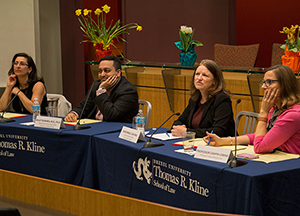The law school resembled an ashram of sorts on April 6, when a student-led organization hosted a daylong celebration of Mindfulness and the Law.
The day featured a yoga class, a demonstration of Qigong, an exploration of incorporating mindfulness practices in the classroom and a panel discussion featuring legal practitioners and a neuropsychiatrist.
Organized by the newly formed Mindfulness and the Law Society, the event was part of a fledgling movement to incorporate meditative techniques into legal practice and education.
“Mindfulness is something you can take everywhere,” said 2L Lex Harris, the co-chair of the law school’s Mindfulness in the Law Society. “It expands your awareness from yourself to others.”
Developing the discipline to slow rushing thoughts and focus on the present moment, aware of emotions and bodily sensations like breathing is beneficial in stressful situations, said members of a panel moderated by Professor Chapin Cimino that included a lawyer, a judge and a neuropsychiatrist.
 Employing mindfulness in the courtroom seems counter-intuitive, since the venue is often considered a battlefield, Judge Lisa Rau explained.
Employing mindfulness in the courtroom seems counter-intuitive, since the venue is often considered a battlefield, Judge Lisa Rau explained.
But Rau, who sits on the Court of Common Pleas, First Judicial District, said mindfulness allows attorneys to listen and respond more carefully.
“They’re still being an advocate but they’re more effective,” Rau said, adding that she has become a better and more patient judge since developing practices that include meditation and mindfulness.
Listening without judgment is tremendously valuable, Ballard Spahr partner Katayun Jaffari, said, describing how she unknotted a stressful impasse between an associate and a client simply by letting them both vent about their perceptions.
Jaffari said that colleagues previously looked at her like she had three heads when she discussed mindfulness, but that the practice has gained more widespread recognition as an effective professional tool.
Dr. Anup Sharma, a research fellow in neuropsychiatry at the University of Pennsylvania’s Perelman School of Medicine, explained that breathing profoundly affects one’s ability to cope with stress.
“How we breathe is intrinsically connected to the brain,” said Sharma, who has conducted studies of clinically depressed patients who have experienced significant reduction in symptoms through mindfulness.
Contending more law schools should take an interest in the discipline, Rau praised the Kline School, which she said is “always on the cutting edge.”
Cimino commended Harris and other students who took the lead in forming the society and organizing the day.